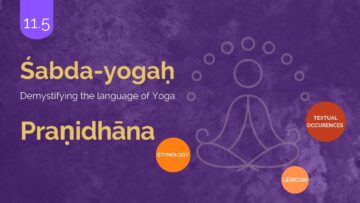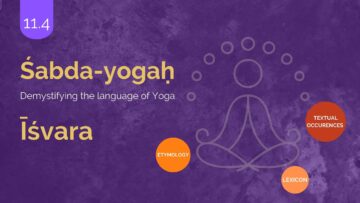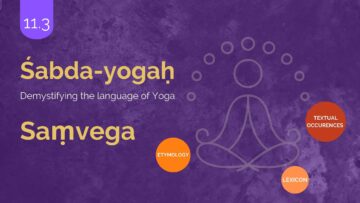Introduction
In this series, Yogic terminologies will be taken up and their –
- (a). Etymological analysis,
- (b). Lexical descriptions and
- (c). Textual occurrences in Yogic literature and their commentaries, as available, will be presented. And finally observations will be made on the references.
Three texts – Yogasūtra, Haṭha-yoga-pradīpikā and Bhagavad-gītā are consulted for textual occurrences portion.
Śabda-yoga is intended to help students, teachers, and professionals of Yoga to develop a sound grammatical, contextual, and thereby an authentic and immersive understanding of Yoga terminologies.
Analysis of Yogic Term
शब्द – Śabda
Etymology
शब्द+घञ् = शब्दः
śabda+ ghañ = śabdaḥ
- The root is śabda to mean शब्दाविष्कारेśabdāviṣk āre – manifestation of sound, to utter
- The suffix is ghañ is used in the sense of bhava – the act. This suffix is added as the grammatical rule भावेbhāve (aṣṭādhyāyī 3.3.18)
Hence the derivative statement would be शब्द्यतेइतिशब्द – śabdyateitiśabda the act of manifesting sound.
Lexicon
There are three references from amarakośa for the term śabda
- रूपंशब्दोगन्धरसस्पर्शाश्चविषयाअमी5.7.– rūpaṃśabdogandharasasparśāścaviṣayāamī Here the word Śabda is listed among the objects of the senses (sense of hearing)
- अपभ्रंशोऽपशब्दःस्याच्छास्त्रेशब्दस्तुवाचकः – 6.2 apabhraṃśo’paśabdaḥsyācchāstreśabdastuvācakaḥ Apabhraṃśa & Apaśabda are words that indicate words that are wrong. Scripturally and textually correct words are called as śabda.
- शब्देनिनादनिनदध्वनिध्वानरवस्वनाः – 6.22. śabdeninādaninadadhvanidhvānaravasvanāḥ Nināda, ninada, dhvani, dhvāna, rava, svana are the synonyms for śabda
The sense that these three lexical references give is – śabda is object of hearing, it also denotes the proper grammatically formed word, and also sound.
Textual Occurrences
Yogasūtra
There are three references to the word Śabda in this text.
- शब्दज्ञानानुपातीवस्तुशून्योविकल्पः॥१.९॥ śabdajñānānupātīvastuśūnyovikalpaḥ.. 1.9.. śabdajñānānupātī is the expression to be noted here. Vikalpa or imagination is stated as a knowledge that follows only from words and does not have any corresponding (real) objects (in the world).
- तत्रशब्दार्थज्ञानविकल्पैःसंकीर्णासवितर्कासमापत्तिः॥१.४२॥ tatraśabdārthajñānavikalpaiḥsaṃkīrṇāsavitarkāsamāpattiḥ .. 1.42 .. savitarkāsamāpattiḥ is defined as a state of mind where there is an imaginary admixture of śabda –word, artha – object and jñān – knowledge.
- शब्दार्थप्रत्ययानामितरेतराध्यासात्संकरस्तत्प्रविभागसंयमात्सर्वभूतरुतज्ञानम्॥३.१७॥ śabdārthapratyayānāmitaretarādhyāsātsaṃkarastatpravibhāgasaṃyamātsar vabhūtarutajñānam .. 3.17 ..
This verse also speaks of the admixture of the words, object and the knowledge of any object and by doing saṃyama (dhāraṇā, dhyāna, samādhi) on the mutual distinctness of words, object and the knowledge – the knowledge of calls of all living beings will arise.
Bhagavdgita
There are five references to the word Śabda in this text.
- ततःशङ्खाश्चभेर्यश्चपणवानकगोमुखाः। सहसैवाभ्यहन्यन्तसशब्दस्तुमुलोऽभवत्॥१.१३॥ tataḥśaṅkhāścabheryaścapaṇavānakagomukhāḥ . sahasaivābhyahanyantasaśabdastumulo’bhavat .. 1.13 .. This verse from the opening chapter speaks about the tumultous sound (śabda) that arose from the simutameous blowing of the conches, beating of drums etc in the warfield
- श्रोत्रादीनीन्द्रियाण्यन्येसंयमाग्निषुजुह्वति। शब्दादीन्विषयानन्यइन्द्रियाग्निषुजुह्वति॥४.२६॥ śrotrādīnīndriyāṇyanyesaṃyamāgniṣujuhvati . śabdādīnviṣayānanyaindriyāgniṣujuhvati .. 4.26 .. The offering of the words etc (the objects of the senses) into the senses that are in the form of Agni is described here. śrīśaṅkarabhagavatpāda andĀcāryaānandagiri clarify that becoming free from passion and hatred and offering the words and other objects of the senses (experiencing the respective objects of the senses), which are not proscribed by the Śāstras, in the senses is what is intended here. In the process of describing jñānamayayajña – yajñas in the form of knowledge (which are superior to the material yajñas) – the above yajña by the Indiryas is described.
- पूर्वाभ्यासेनतेनैवह्रियतेह्यवशोऽपिसः। जिज्ञासुरपियोगस्यशब्दब्रह्मातिवर्तते॥६.४४॥ pūrvābhyāsenatenaivahriyatehyavaśo’pisaḥ. jijñāsurapiyogasyaśabdabrahmātivartate.. 6.44.. The expression śabdabrahma is used here. It is stated here in that a person who desires to explore and understand Yoga shall transcend the (relatively ephemeral) outcomes of the Vedic Karmas (śabdabrahma).
- रसोऽहमप्सुकौन्तेयप्रभास्मिशशिसूर्ययोः। प्रणवःसर्ववेदेषुशब्दःखेपौरुषंनृषु॥७.८॥ raso’hamapsukaunteyaprabhāsmiśaśisūryayoḥ . praṇavaḥsarvavedeṣuśabdaḥkhepauruṣaṃnṛṣu .. 7.8.. “I am the sound in the ether” says Lord Kṛṣṇa in this verse. The how of the statement of previous verse in the text (7.7) “Everything is woven into me” is elucidated by this verse. According Vedic ontology, sound is the substratum of element ether. Hence if Lord Kṛṣṇa is the sound, ether is established in sound and in ether everything else is established. Hence by this flow of thought, the statement “Everything is woven into me” is explained.
- बुद्ध्याविशुद्धयायुक्तोधृत्यात्मानंनियम्यच। शब्दादीन्विषयांस्त्यक्त्वारागद्वेषौव्युदस्यच॥१८.५१॥ buddhyāviśuddhayāyuktodhṛtyātmānaṃniyamyaca . śabdādīnviṣayāṃstyaktvārāgadveṣauvyudasya ca .. 18.51 .. In the last chapter of the text, in the context of this verse it is stated that the very high state of knowledge (jñānasyaniṣṭhā) is attained by having a clear intellect, by controlling oneself (from taking the path of carnal desires) with the great courage, by shunning the objects of the senses like the sound etc (śabdādīnviṣayān) and by overcoming passion and hatred.
Haṭhayogapradīpikā
There are six references to the word śabda in this text. They are as follows –
- 1) गोशब्देनोदिताजिह्वातत्प्रवेशोहितालुनि। गोमांसभक्षणंतत्तुमहापातकनाशनम्॥३.४८॥ gośabdenoditājihvātatpraveśo hi tāluni . gomāṃsabhakṣaṇaṃtattumahāpātakanāśanam .. 3.48.. ‘Gośabda’ is the expression found here. In the previous verse it was stated ’गोमांसंभक्षयेत्’– one should eat the meat of the cow. To clarify that “eating of cow meat” should not be taken literally, in this verse it is clarified that the word go/cow (Gośabda) should be understood to mean the tongue (jihvā) and the entry of the tongue into the cavity of the palate region is called as eating the meat of the cow. It is to be noted that this coded discussion is about the Yogic practice khecarī.
- 2) कुटिलाङ्गीकुण्डलिनीभुजङ्गीशक्तिरीश्वरी। कुण्डल्यरुन्धतीचैतेशब्दाःपर्यायवाचकाः॥३.१०४॥ kuṭilāṅgīkuṇḍalinībhujaṅgīśaktirīśvarī . kuṇḍalyarundhatīcaiteśabdāḥparyāyavācakāḥ .. 3.104 .. Herein it is stated that the words (śabdāḥ) – kuṭilāṅgī, kuṇḍalinī, bhujaṅgī, śakti, īśvarī , kuṇḍali and arundhatī are synonyms.
- 3) विष्णुग्रन्थेःततोभेदात्परमानन्दसूचकः। अतिशून्येविमर्दश्चभेरीशब्दस्तदाभवेत्॥४.७३॥ viṣṇugrantheḥtatobhedātparamānandasūcakaḥ . atiśūnyevimardaścabherīśabdastadābhavet .. 4.73 .. Bherīśabda – the sound of the bherī/kettle drum is the expression to be noted here. When the prāṇa pierces the Viṣṇugranthi the sound of the kettle drum will manifest in the throat region. It is to be noted that this is a stage in the practice of nādānusandhāna towards attainment of the Samādhi.
- 4) रुद्रग्रन्थिंयदाभित्त्वाशर्वपीठगतोऽनिलः। निष्पत्तौवैणवःशब्दःक्वणद्वीणाक्वणोभवेत्॥४.७६॥ rudragranthiṃyadābhittvāśarvapīṭhagato’nilaḥ . niṣpattauvaiṇavaḥśabdaḥkvaṇadvīṇākvaṇobhavet .. 4.76 .. This is a verse similar to the previous one. This speaks of the next stage in piercing the granthis. The granthi that is pierced by prāṇa isrudragranthi – in the region in between the eyebrows. When this happens the sound (śabda) of the lute (vīṇā) will be heard.
- 5) अनाहतस्यशब्दस्यध्वनिर्यउपलभ्यते। ध्वनेरन्तर्गतंज्ञेयंज्ञेयस्यान्तर्गतंमनः। मनस्तत्रलयंयातितद्विष्णोःपरमंपदम्॥४.१००॥ anāhatasyaśabdasyadhvaniryaupalabhyate. dhvanerantargataṃjñeyaṃjñeyasyāntargataṃmanaḥ. manastatralayaṃyātitadviṣṇoḥparamaṃpādam .. 4.100 .. Anāhatasyaśabdasya – is the expression found in this reference. The culmination the practice of nādānusandhāna is stated in this verse where it is stated that by focusing on the dhvani of the anāhata (the unstruck Yogic) sound (śabda) gradually the mind gets absorbed in the indwelling consciousness.
- 6) तावदाकाशसङ्कल्पोयावच्छब्दःप्रवर्तते। निःशब्दंतत्परंब्रह्मपरमात्मेतिगीयते॥४.१०१॥ tāvadākāśasaṅkalpoyāvacchabdaḥpravartate . niḥśabdaṃtatparaṃ brahma paramātmetigīyate .. 4.101 .. As evident from this reference being the subsequent verse to the previous one, the culmination of nādānusandhāna is discussed here also. It has been stated that as long as sound is exists/perceived in the practice (nādānusandhāna) this idea of ether (and the rest of the created world exists). When the sound (of (nādānusandhāna)) falls silent (by higher state of vairāgya), the Brahman which is beyond even the (subtle) sound, gloriously exists.
Observations
From the above references in Yoga treatises consulted here the word śabda is used in at least six different meanings –
- Sounds emanating from various instruments (conch, drum etc)
- the word (used in language to convey ideas)
- the Vedas
- the object of the sense of hearing
- the causal matter of ether
- the unstruck Yogic sound
This range of different meanings and contexts of usage necessitates careful study of the text and the context to derive the correct meaning.
Unit 6 To be Continued…
Links for previous posts in this unit
Feature Image Credit:istockphoto.com
Disclaimer: The opinions expressed in this article belong to the author. Indic Today is neither responsible nor liable for the accuracy, completeness, suitability, or validity of any information in the article.











